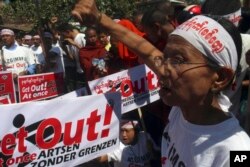RANGOON —
Doctors Without Borders, the largest single provider of anti-retroviral HIV/AIDS treatment in Burma - also known as Myanmar - has closed its clinics around the country for the first time since it began working there after receiving an order from the government to cease all operations.
An outreach worker from Mandalay, who goes by the name of Casper, has been HIV-positive for over 10 years, and helps HIV-positive people get tested and get counseling. He has been traveling to a Doctors Without Borders clinic in Rangoon once a month to get life-saving drugs the government could not provide for him. On Saturday, he was told he will no longer be able to continue treatment after Doctors Without Borders was ordered to cease operations.
He said that if there were no treatment from Doctors Without Borders, people would have to rely on government programs, and there would be many people in pain and suffering.
Doctors Without Borders said in a statement Friday they were "deeply shocked" by the order, and the decision would have a "devastating impact" on the 30,000 HIV patients and 3,000 tuberculosis patients they are currently treating.
The organization works in a number of conflict areas across the country, but has been accused of favoring stateless Muslim Rohingya in Rakhine state, a minority group of people who have been forced out of their homes to live in camps where their movements are restricted.
Government spokesperson Ye Htut told media the organization had been ordered to cease operations, and had falsely claimed it had treated victims of violence around the time of an alleged massacre in January, which the government denied happened.
But after international pressure, Burma's government appears to be back-pedaling. Ye Htut said the government had not ordered a countrywide ban, just a Rakhine state ban for Doctors Without Borders.
"Other parts of the country they are ok, but in Rakhine state they didn't follow their core principles of impartiality and they didn't follow the conditions set in the MOU. with the ministry of health, but after we reach the agreement for the new MOU. we will solve all these problems," he said.
Even if the ban is limited to Rakhine state, thousands of patients living in dire conditions will have to do without the primary care provided by the medical charity every day.
According to UNAIDS, there are already more than 90,000 people living with HIV in Burma who need anti-retrovirals and have no access to them. Though $160 million was pledged to help improve access last year to treatment for HIV, tuberculosis and malaria, the government has not been able to accommodate any new patients for anti-retrovirals.
The medicines are so scarce in Burma that patients must have a CD-4 count below 350 in order to qualify for treatment, rather than the customary 500.
Burma's current national budget reserves only 3 percent of its outlays for health and education combined.
An outreach worker from Mandalay, who goes by the name of Casper, has been HIV-positive for over 10 years, and helps HIV-positive people get tested and get counseling. He has been traveling to a Doctors Without Borders clinic in Rangoon once a month to get life-saving drugs the government could not provide for him. On Saturday, he was told he will no longer be able to continue treatment after Doctors Without Borders was ordered to cease operations.
He said that if there were no treatment from Doctors Without Borders, people would have to rely on government programs, and there would be many people in pain and suffering.
Doctors Without Borders said in a statement Friday they were "deeply shocked" by the order, and the decision would have a "devastating impact" on the 30,000 HIV patients and 3,000 tuberculosis patients they are currently treating.
The organization works in a number of conflict areas across the country, but has been accused of favoring stateless Muslim Rohingya in Rakhine state, a minority group of people who have been forced out of their homes to live in camps where their movements are restricted.
Government spokesperson Ye Htut told media the organization had been ordered to cease operations, and had falsely claimed it had treated victims of violence around the time of an alleged massacre in January, which the government denied happened.
But after international pressure, Burma's government appears to be back-pedaling. Ye Htut said the government had not ordered a countrywide ban, just a Rakhine state ban for Doctors Without Borders.
"Other parts of the country they are ok, but in Rakhine state they didn't follow their core principles of impartiality and they didn't follow the conditions set in the MOU. with the ministry of health, but after we reach the agreement for the new MOU. we will solve all these problems," he said.
Even if the ban is limited to Rakhine state, thousands of patients living in dire conditions will have to do without the primary care provided by the medical charity every day.
According to UNAIDS, there are already more than 90,000 people living with HIV in Burma who need anti-retrovirals and have no access to them. Though $160 million was pledged to help improve access last year to treatment for HIV, tuberculosis and malaria, the government has not been able to accommodate any new patients for anti-retrovirals.
The medicines are so scarce in Burma that patients must have a CD-4 count below 350 in order to qualify for treatment, rather than the customary 500.
Burma's current national budget reserves only 3 percent of its outlays for health and education combined.





